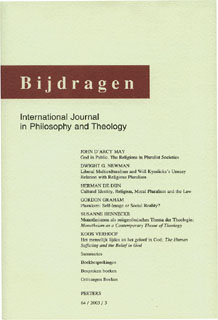 previous article in this issue previous article in this issue | next article in this issue  |

|
Document Details : Title: Gnosis, Modernity and Divine Incarnation Subtitle: The Voeglin-Blumenberg Debate Author(s): STYFHALS, Willem Journal: Bijdragen Volume: 73 Issue: 2 Date: 2012 Pages: 190-211 DOI: 10.2143/BIJ.73.2.2172318 Abstract : What is the nature of modernity? What are its roots and what is its future? These are omnipresent and central questions today, in philosophy as well as in several other domains. Some twentieth century philosophers have argued that we can understand modernity by referring to a specific ancient religious movement called Gnosticism. This article focuses on two philosophers who have developed the relation between Gnosticism and modernity, albeit in different directions, namely Eric Voegelin and Hans Blumenberg. The main purpose of this article is to understand on a philosophical level why the notion of Gnosticism plays a significant role in the contemporary debate about modernity. I argue that the reference to Gnosticism is related to an essential ambiguity or instability in Christianity. In this regard, Marcel Gauchet’s Le Désenchantement du Monde can be very illuminating. Time and again, Gauchet refers to an oscillation inherent in Christianity that is at the base of modernity. He links this tension to the Christian doctrine of incarnation. In this respect, modernity as well as Gnosticism can be interpreted as reactions to this instability, as a kind of collapse of the inner Christian tension. |
